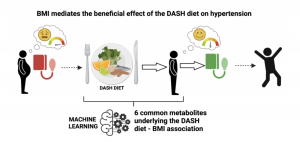
Could the DASH Diet Help Reduce High Blood Pressure?
In a recent study, TwinsUK researchers found that following the DASH diet was linked with reduced blood pressure and that this may be as a result of a simultaneous reduction in weight.
High blood pressure is a very common although adaptable risk factor for heart disease and deaths worldwide. Risk factors for high blood pressure include both genetic predisposition and environmental or lifestyle factors, such as diet, alcohol use, and inactive behaviour. The DASH diet – which stands for Dietary Approaches to Stop Hypertension – consists of foods like fruits, vegetables, whole grains, nuts, and low-fat dairy products, and aims to reduce the consumption of red meats and full-fat dairy products.
The DASH diet was developed to combine the effects of many foods and nutrients that have been shown to help lower blood pressure and has been supported by several successful clinical trials. Some countries, including the USA and many European countries, advocate the DASH diet as a suitable nutritional approach for preventing high blood pressure.
In this present study, the TwinsUK researchers found that body mass index (BMI) is the link between the DASH diet and changes in high blood pressure. The team also identified six molecules in the blood linked with the DASH diet and BMI, indicating shared metabolic pathways.
The researchers included 2,424 female participants from the TwinsUK cohort with blood pressure and BMI measurements and food intake data. The team investigated the relationship between adherence to a DASH diet and blood pressure in the volunteers.
One limitation of the research is that the study looked at data only from women and at one specific time point. This means it is difficult to make an accurate conclusion about whether or how the DASH diet reduces blood pressure without further clinical studies.
First author Panayiotis Louca said:
“Our study presents novel insights into the relationship between the DASH diet, high blood pressure, and BMI. Further studies should be done to look into the underlying molecular mechanisms to improve our understanding of how to treat high blood pressure.”
Senior author Cristina Menni said:
“The team highlight that the findings further our knowledge of the molecular mechanisms at play and may be relevant in developing dietary guidelines for preventing high blood pressure, for future global health.”

Louca et al. 2021. Body mass index mediates the effect of the DASH diet on hypertension: Common metabolites underlying the association. The Journal of Human Nutrition and Dietetics
